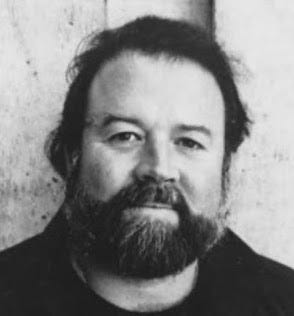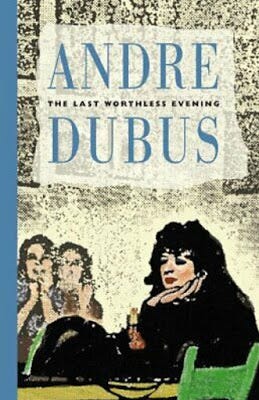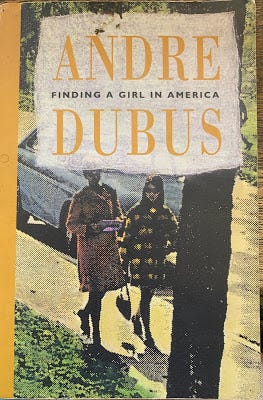The Power of the Ordinary
READING ANDRE DUBUS
This essay is the first of a new series devoted to literature, reading, writing, and books as culture. Substack now offers an extra newsletter under the same host. I have a lot to say about these subjects and I hope you will enjoy it.
I wrote this essay last year. Being at home a lot and delving deeply into narrative models, I had to return to the master of interior emotion, Andre Dubus, whose work and whose person I was both introduced to in my college days. He didn’t teach there but had until recently, and they taught his stories in the creative writing classes. He came around from time to time, did some of his writing in the library, and had a friend who owned a bookshop in Haverhill, The Phoenix Bookshhop, where I bought a lot of books. Some of them were second hand and had the words Property of Andre Dubus written in them. Anyway, here’s an essay on the power of the ordinary.
Every writer has at least one precursor who serves as a lodestone--someone whose example recharges their literary batteries. If one lives long enough there can be more than one, for each period in a writer’s growth. One in particular to whom I return again and again is Andre Dubus. He taught at my alma mater for a dozen years before I arrived, but circumstances cut his teaching career short. Dubus was known primarily as a writer of stories, which usually appeared in literary journals and in some commercial magazines also. He was known mainly to other writers and a slew of editors though I am sure there were many fans of great contemporary fiction, like myself, who have loved his writing over the years. He has become somewhat eclipsed by the success of his oldest son, Andre Dubus III, whose novels and a memoir called Townies have become quite celebrated, and with good cause.
The unfortunate circumstances of Dubus’s personal story have somewhat eclipsed his reputation as a writer, although his Boston based publisher, David R Godine, has just recently republished nearly everything in three beautiful paperback volumes with titles taken from alternate stories and introductions by literary writers influenced by him. The circumstances of which I speak are that one evening while returning home on the highway, Dubus witnessed a car crash. When he went to aid the victims he got hit by a car himself, and was paralyzed from the waist down. He spent the next few years recovering from his injuries while running a writing workshop out of his home in Haverhill MA. It was during this time that I arrived at the college where he had taught for 20 years before this event. I spent more than the average four years at Bradford, and had friendships and relationships with students who were from the area. There was a bookshop in town run by Dubus’ roommate, Jack Herlihy. I bought some books from Andre’s personal library there and even met him there on a few occasions when our visits coincided.
But let me get to the heart of the matter, those stories. I have been reading Dubus for over 30 years and my understanding of the depth of the humanity in his stories have grown along with my own development as a human being. Though I have owned his books for many years I have not yet exhaustively read every story. The stories are very strong in emotional content, and it takes me a while to digest.
“Deaths At Sea” (1986) is told in letters by a sailor named Gerry Fontentot to his stateside wife, who has a new roommate named Willie whom he is becoming friends with, who happens to be African-American. The story explores the various dimensions of Gerry’s duties and hardships in his military career--his distance from his beloved wife, the danger of being around explosives and firearms, and the complicated social order. Being a Southerner, Gerry carries within him a sort of historical guilt. He feels the need to express all manner of “feelings” regarding events in the cultural history of black repression, like the slaying of Emmett Till and Martin Luther King Jr. Such moments do create shared historical circumstances no matter where one falls in the political spectrum. Yet his need to fall back upon cultural touchstones couched in tragedy shows his naivete. Is it necessary to indulge in such emotionally freighted discussions? Is it necessary to cover so much racialized ground in order to reach a manly commonality with his friend? Or does it show his sensitivity? These are all questions that naturally arise in confronting the narrative Dubus builds around a fragile ego in search of true friendship with someone so alien to him. The two men seem to bond well. The depth of their connection is proven at a point later in the story when Willie encounters one of two other African-American Marines serving on the same boat. He is a Lieutenant Commander named Percy and he is a Southern African-American man whose rank allows him to corner Willie and confront him with another version of racialized experience, one from a Southern to a Northern. Gerry witnesses Percy holding forth while Willie does everything in his power not to lash out and commit an unpardonable offense against a senior officer. After they leave the party Gerry comforts Willie who’s outside crying from rage and guilt. This most touching scene shows to degree to which the two men have bonded like true brothers.The rest of the story is a slow denouement, in which Gerry, handling Duty Officer for sailors returning from bars on the mainland, has to process the arrest of a young black seaman who has been involved in a fight in which a white seaman died. He receives the man with as little procedurality and as much respect as he can muster, and we witness him questioning the sailor while another C.O. types it all out. We hear the story, which involves a group of drunken soldiers awaiting transport back to their ships, an accident in which one sailor steps back and bumps into another one. He replies with a racially charged epithet and violence ensues. Both tumble into the water and only the negro sailor emerges. Neither was doing anything at that moment but trying to survive being underwater in a drunken state. Despite its emotional pull, this story has little effect on Gerry except that it subtly compounds the racialized context of his own existence upon the ship. We end the story with him returning to his bunk and life going on. That’s perhaps one of the eternal parables within Dubus’s oeuvre, that in writing about real life we cannot set these situations aside. They exist as part of the greater context of lived experience, and so they inevitably melt into our lives as they get lived.
In “Finding A Girl in America” (1980), a creative writing teacher at a small New England college, years after losing his marriage to adultery, hears from his current girlfriend that his last girlfriend--also a friend of hers-- was pregnant with his child and having never told him, chose to get an abortion. He undergoes an emotional withdrawal accompanied by ego-fueled shadow boxing matches, weird dreams of fetuses on the beach, and an assessment of his current life situation, jumping from one student lover to another. He even has a system for wiping each one from his conscience. A sad man chasing desperate dreams, lost without his original partner, the trust of his child, and a path toward future happiness. Part of me is so embarrassed for him that I find it difficult to read. This story takes him through all the emotional acts of the six years since his divorce, and makes an accounting of the ways in which he has conducted himself, as a man and a person, with the women who have been his companions and lovers. The story opens with Hank dating his fourth girlfriend since his divorce, whom his ex-wife calls “the one” which throws him for a loop. By this time I was not sure whether I still liked him at all. The problem with emotional realism is that it has to push beyond our comfort zone, making condemnation almost necessary. Dubus addresses the so-called ethical high ground, but in doing so risks everything. But this story is not only about Hank; it’s about Lori as well. Just at the moment when we think we’ve heard enough of his bathos, Dubus alternates, making the story more about the larger story around each of them. He recounts Hank’s gatherings with Lori and her family, of the dynamic between himself and both the father and the mother. Dubus takes their feelings into account, not just concerning Lori and her best interests, but also regarding some supposition into the natures of each of them, her mother in particular, whose character shines a light upon his daughter, though Hank sees how they are radically different.
Most of the rest of the story, until just before the end, is about Lori. It tells the story of the last couple years of her life, of her emotional changes and life events, and what brought her into a life with Hank. It begins before him, with a summer job where she had a male coworker who became her first sexual partner. But he was immature and it didn’t last. Then she was taking Hank’s literature classes and internally swooning over his rapturous perspective on writers like Chekhov. Then he ends it with his friend and soon after takes up, however tentatively, with her.
One might think of Hank as a wolf swooping in to feast on shy does, but he’s not that guy. What he is, and what he has been since his marriage, is commitment phobic. For whatever reason, perhaps due to some adolescent desire for freedom, he was unable to be emotionally devoted to his wife. We hear about previous adulteries, and about the one that’s so obvious he actually owns up to it. That’s the end of his marriage, though he and Edith still go through the motions for another three years before he gets his walking orders. Where we meet him is six years after that, and a few lovers later, when he is ready to commit again. Though he hardly knows it yet. That’s the story inside this one. It ends with a scene in which he and Lori meet for a picnic. He explains his state of mind, where he finds himself emotionally, and how she fits in with everything, He tells her they will abstain from sex because he doesn’t just want to bed her, he wants to court her. He wants her for his wife. She gives him her Yes right there. They talk about how they’re going to break it to her family, and about future plans, both immediate and less so. They are already talking like a committed couple, like a We. This is the secret of marriage that Hank has denied himself in the past. Partners have to stay partners, in all things, an emotionally tender yet strong match, to take them into the unknown.
I have discussed two different stories at length. I could revisit Dubus over and over again and not crack the surface of what he has to tell. I will keep reading his books, hopefully gleaning his truths, and sharing them whenever I can, as I find them in my own stories. I know he has affected me thoroughly. For I have also lived in some of the places he lived. I know the streets his characters walk down, the hills and woods they jog or drive through. I know the bars where they go. I have some affection and even some nostalgia for these places, and I know people who live in or near them still. They are alive in me even more for being distant. But they’re real, not mythical. I can Google them anytime and look upon them as they are. A part of me remains in these memories, as does Dubus and the world to which he gave gravity and power.





Thanks for a reminder of Dubus' work I have read some in the past and found them tough yet tender and truthful.